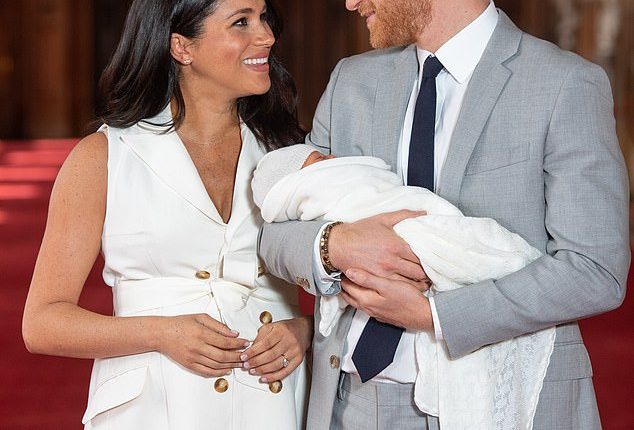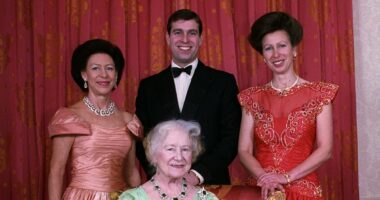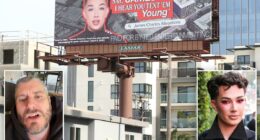Share this @internewscast.com
Like many Americans, Meghan Markle seems to be bemused by the historical British tradition of issuing titles to members of the Royal Family.
Although she is often enthusiastic about making the most of her and Harry’s Duke and Duchess of Sussex titles, she is alleged to have been less keen on one of the ones bestowed to her son Archie – Lord Dumbarton.
When she heard the news he would automatically get the title, royal author Tom Bower claims she said: ‘Hell no. No son of mine is going to be called Dumb’.
In his 2022 book Revenge, he wrote that she was told the news by Sir Thomas Woodcock, the Garter of Arms, when he called her to discuss Archie’s titles soon after he was born in May 2019.
When Harry and Meghan got married the previous year, as well as gaining their more commonly used titles for England, it was announced they would also be referred to as the Earl of Dumbarton in Scotland and the Baron Kilkeel in Northern Ireland.
But despite already being the Countess of Dumbarton herself, Meghan was said to be upset at the news it would also be used by her son, according to Bower.
When Archie was born, it was his birthright to take the Earl of Dumbarton title but his parents were reportedly concerned that it would lead to mockery.
A source told The Telegraph in 2021: ‘They didn’t like the idea of Archie being called the Earl of Dumbarton because it began with the word “dumb” [and] they were worried about how that might look.’

Prince Harry and Meghan Markle did not want to use the Earl of Dumbarton title for their son Archie because it contained the word ‘dumb’, according to a report

The Duke and Duchess of Sussex are alleged to have not been keen on the title because they feared the young royal might be mocked

Meghan, Duchess of Sussex, places her hand next to her baby son Archie Harrison Mountbatten-Windsor at the photocall to celebrate his birth at Windsor Castle
Another insider told the paper: ‘It wasn’t just Meghan who pointed out the potential pitfalls, it also bothered Harry.’
But the decision to unceremoniously ditch the title caused something of a political wave at the time, with the Dumbarton locals coming out swinging against the move.
A Labour Member of the Scottish Parliament Jackie Baillie said: ‘I am very proud to be the MSP for Dumbarton. It is my home. Dumbarton is a wonderful place and the people of Dumbarton have always prided ourselves on being open and accepting.
‘We welcome with open arms anyone who wishes to be associated with or call Dumbarton their home.
‘If the rumours about Harry and Meghan are true, then I would encourage them to rethink their decision as I think there is no greater honour than being named after the town.’
A number of Dumbarton natives also took to social media to slam the couple when the news broke in 2021, with some claiming the ‘Earl of Wokingham’ would be a better fit for the couple.
Lifelong residents of Dumbarton, a small town west of Glasgow, rejected the suggestion that Archie would be bullied for the association and insisted that sharing the town’s name was something to be proud of.
However, the Dumbarton title was was not the only cause of concern the royal couple had when it came to what Archie would one day be called.
Shorty after his birth they said in a statement that he would not be a referred to as prince, because they did not want to be bound by convention or history.

The Duke and Duchess of Sussex play with their son Archie during a meeting with Archbishop Desmond Tutu on August 23, 2022

An old Christmas card with Prince Harry and Meghan Markle holding Archie and Lilibet

The Queen and Prince Philip visit newborn Archie at Windsor Castle

Meghan, her mother Doria, and Harry are seen playing with Archie in their Netflix TV series

Footmen present the easel in the forecourt of Buckingham Palace to formally announce the birth of Archie

The Duke of Sussex speaking at Windsor Castle in Berkshire on May 6, 2019, after the Duchess of Sussex gave birth to Archie who weighed 7lbs 3oz
Instead, they wanted him to be plain ‘Mister Archie’ and not bear the title of royal, which was done to help preserve his privacy.
However, when Lilibet was born, Harry and Meghan seemingly U-turned and began to use the titles prince and princess.
The Palace then updated its website’s line of succession list with their official titles.
It is understood the titles will be used in formal settings, but not in everyday conversational use.
Harry and Meghan are understood to be keen to not deny their children their birthright, but to allow them the chance to decide for themselves when they are older whether to drop or keep using them.
The decision raised some eyebrows after Prince Harry’s repeated criticism of the monarchy, including his accusation that his family carried out ‘total neglect’ in the past and saying he suffered ‘genetic pain’.
He has spoken about his own struggles with his title, saying in 2017 that his time in the Army was the ‘best escape I ever had’ because ‘I wasn’t a prince, I was just Harry’.
Following the row, royal commentator Emily Andrews tweeted in March 2023: ‘The perennial question still remains; if being a royal is so traumatic, such a burden, carries so much inter-generational pain why would you want to style your kids prince and princess/keep your own royal titles….??’
However, according to British law, Archie was always destined to automatically become a prince after the Queen died due to long-standing rules.

When Archie was born, Harry and Meghan said he would not use the title prince

Perhaps things will change when he is older, but at the moment it looks like Archie will not be using the Lord Dumbarton title for as long as his parents are in charge
But Meghan and Harry have not been the only royal couple to decide that the titles of prince and princess would not be suitable for their children.
Prince Edward and his wife Sophie, Duke and Duchess of Edinburgh, made the decision early on that their children would not carry the titles, to make it clear to them that they needed to make their own way in life.
Princess Anne also chose not give titles to her son Peter and daughter Zara.
However, it seems Harry and Meghan have opted for another option entirely, and have instead been referring to their children by the names Archie Sussex and Lilibet Sussex, rather than their real surname of Mountbatten-Windsor.
A source told The Times in February that the adoption of the Sussex title as a surname was done to ‘unify’ their family.
Nevertheless, the historic Earl of Dumbarton title, which was first created in the Peerage of Scotland in March 1675 for Lord George Douglas for services fighting in the Franco-Dutch War, remains unused.
The title became extinct in January 1749, and was only recreated in the UK Peerage by the Queen as one of the two subsidiary titles for her Harry when he married Meghan in May 2018.
Perhaps things will change when he is older, but at the moment it looks like Archie will not be using the Lord Dumbarton title for as long as his parents are in charge.










